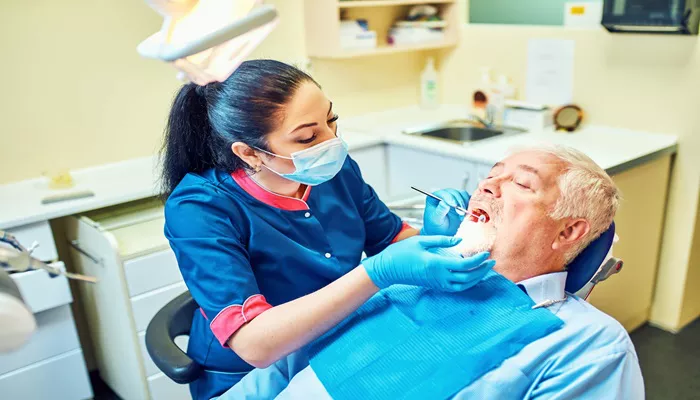Courtney Sands felt a relentless pain in her mouth, stemming from an infection that required root canals and crowns for two molars. This spring, a visit to an endodontist revealed another hurdle: the office demanded thousands of dollars upfront before any treatment could begin.
Sands returned a week later for her crowns. Despite having dental insurance through both her job and her husband’s, she was required to pay out of pocket before receiving care. She charged over $6,000 to a high-interest credit card. Later, the insurance companies reimbursed her only a fraction of her expenses—$1,000 from one insurer and $395 from the other.
Sands is among the fortunate few when it comes to dental care access. More than half of U.S. adults lack consistent access to dental services, and untreated oral health issues can lead to serious health problems. Yet, despite these challenges, dental coverage remains a low priority among political leaders.
In recent debates, Vice President Kamala Harris and former President Donald Trump have focused on topics like abortion and insulin prices. However, neither candidate has emphasized the need to expand dental care for millions of uninsured Americans.
Polling data shows that covering oral health is a popular issue among voters. A recent survey conducted by CareQuest Institute for Oral Health found that about 90% of respondents support adding dental benefits to Medicare. This sentiment is nearly universal among Democrats and has strong backing from 85% of Republicans.
Despite this widespread support, neither Harris nor Trump has included dental coverage in their campaign platforms or major speeches. Their discussions have centered on issues like grocery prices and healthcare reform, leaving dental care largely unaddressed.
The need for improved dental coverage is stark. Nearly 69 million U.S. adults lacked dental insurance or access to routine oral care last year, according to CareQuest. Many more lost their dental insurance as states began rolling back Medicaid coverage initiated during the COVID-19 pandemic.
SEE ALSO: Zuri Dental Unveils Enhanced Digital Platform for Improved Patient Experience
Medicare, which primarily serves adults aged 65 and older, does not include routine dental coverage. An analysis by KFF revealed that nearly half of Medicare enrollees had not visited a dentist in over a year as of 2018.
“Far too many people in this country have discovered that oral health care is too expensive and out of reach,” said Melissa Burroughs, director of public policy at CareQuest. “Yet this issue has been really on the back burner when it comes to policy conversations.”
A recent CareQuest poll asked voters to rank various health issues in order of importance. Adding dental coverage to Medicare ranked second overall, just behind lowering prescription drug costs. Voters prioritized this issue over abortion rights and the future of the Affordable Care Act—topics that frequently dominate political discourse.
“This is one of the most popular things in health care according to voters, and we can’t let it continue to fade into the background,” Burroughs said.
While consumers who enroll in private Medicare Advantage plans may choose options that include dental, hearing, and vision care, coverage terms vary significantly by plan. Seniors enrolled in traditional Medicare can purchase separate dental insurance; however, nearly half did not have such coverage as of 2019.
The Democratic Party’s 2024 platform calls for including dental, vision, and hearing benefits in Medicare but lacks specifics on funding these additions beyond suggesting that “the wealthy and big corporations pay their fair share.” The Republican platform does not address dental care at all.
Polling data from CareQuest indicates strong support for Medicare dental benefits in key states like Michigan, Ohio, and Pennsylvania—over 90% of voters in these areas favor adding such benefits.
Sands lives in Factoryville, Pennsylvania, where she works as a nurse alongside her husband. The out-of-pocket costs from her dental emergency have limited their ability to fund home renovations. She now prioritizes paying off her credit card debt.
Congress has begun exploring solutions for expanding dental care access despite its absence from campaign rhetoric. Earlier this year, the Biden administration finalized a rule allowing states to add adult dental insurance coverage under their Affordable Care Act plans. While ACA plans must offer pediatric dental care as an essential benefit, adult coverage was not included when the law was enacted in 2010.
Two bills currently in Congress aim to extend dental coverage through Medicare and Medicaid while also increasing the number of dental professionals nationwide. Senator Bernie Sanders introduced the Comprehensive Dental Care Reform Act of 2024 in May, while Representative Debbie Dingell introduced a companion bill in the House last week.
Neither bill has been scheduled for a vote yet, and the Congressional Budget Office has not estimated their potential costs.
Dingell emphasized that many people avoid visiting dentists due to financial concerns. “A lack of dental care can worsen other serious medical conditions,” she stated upon introducing her bill.
Organizations representing dentists are also advocating for expanded Medicare dental coverage. The American Dental Association expressed support for comprehensive benefits for low-income adults and seniors while endorsing bills aimed at providing adult dental coverage through Medicaid.
“Comprehensive dental coverage means providing low-income seniors with a full range of affordable services they need,” said the ADA.
Sands understands firsthand how crucial access to dental care is for overall health. She feels fortunate to have had credit available for her treatment but knows others are not as lucky.
“People I know have gone years without seeing the dentist,” Sands said. “I’ve seen people with swollen gums and pus coming out of their mouths. There’s nothing they can do.”
Related topics:

